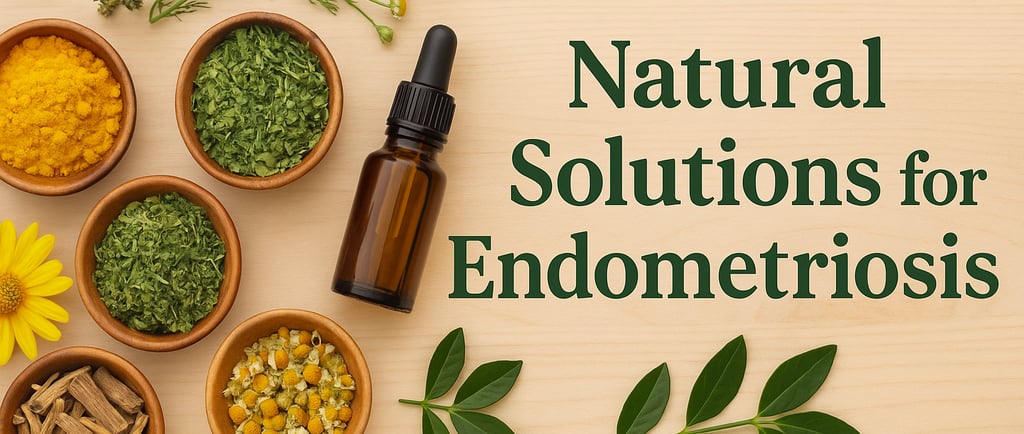Natural Approaches for Managing Endometriosis
Discover science-backed natural solutions for endometriosis, from herbal therapies to integrative approaches, aimed at reducing inflammation, balancing hormones, and improving quality of life for women worldwide.


Endometriosis is a chronic condition affecting millions of women of reproductive age, characterized by severe menstrual pain, pelvic discomfort, and often infertility. This condition occurs when tissue similar to the uterine lining (endometrium) grows outside the uterus, typically on the ovaries, fallopian tubes, or other pelvic organs. These lesions can cause inflammation, scarring, and the formation of painful adhesions.
Prevalence and Impact
Globally, endometriosis affects approximately 10% of women, significantly impacting their quality of life and reproductive health. While conventional treatments such as hormonal therapy and surgery remain standard, many women seek complementary and natural approaches to alleviate symptoms and reduce inflammation.
Key Symptoms of Endometriosis
Severe menstrual cramps (dysmenorrhea)
Chronic pelvic pain
Pain during intercourse (dyspareunia)
Digestive or urinary symptoms during periods
Infertility in advanced stages
What Causes Endometriosis?
Although the exact cause remains unclear, researchers point to a combination of hormonal, immune, and environmental factors. Emerging evidence also highlights the role of the gut microbiome in modulating inflammation and disease progression.
Natural Strategies for Symptom Management
1. Vitex agnus-castus (Chaste Tree Berry)
Supports hormonal balance by modulating estrogen-progesterone ratio.
Traditionally used to reduce menstrual pain and regulate irregular cycles.
2. Curcuma longa (Turmeric)
Rich in curcumin, a powerful anti-inflammatory compound.
Helps reduce pelvic inflammation and oxidative stress.
3. Alchemilla vulgaris (Lady’s Mantle)
Exhibits anti-inflammatory properties, aiding in lesion size reduction.
Traditionally recommended for female reproductive health.
4. Glycyrrhiza glabra (Licorice)
Acts as a phytoestrogen, supporting hormonal modulation.
May benefit women with polycystic ovary syndrome (PCOS) associated with endometriosis.
5. Tanacetum parthenium (Feverfew)
Contains parthenolide, which helps reduce peritoneal inflammation linked to endometriosis progression.
6. Aromatherapy with Neroli (Citrus aurantium)
Provides stress-relief and relaxation, mitigating pain perception and improving emotional well-being.
Why Integrative Care Matters
Combining conventional medical care with evidence-based natural therapies creates a holistic approach, addressing both symptom relief and underlying inflammation. Patients should consult healthcare professionals before incorporating herbal remedies, ensuring safety and proper dosing.
Looking Ahead
The future of endometriosis care lies in personalized, integrative medicine, leveraging both pharmacological advancements and natural solutions. Ongoing research into the microbiome, nutrition, and phytotherapy offers promising insights for reducing the burden of this condition.
References
Zondervan KT, Becker CM, Missmer SA. Endometriosis. Lancet. 2020;395(10224):730-738.
National Institutes of Health. Endometriosis Fact Sheet.
Vercellini P, et al. Herbal Medicine in Endometriosis: A Review. Phytomedicine. 2021;84:153496.
García-Peñarrubia P, et al. Role of Inflammation and Microbiota in Endometriosis Pathogenesis. Front Immunol. 2021.
